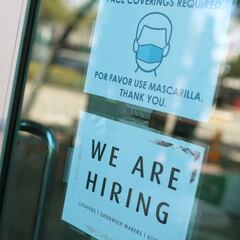Unemployment Benefits: What has the White House said about the effects of ending payments early?
Calls to end federal pandemic unemployment benefits are growing, yet the White House sticks to a message saying they are not keeping workers at home.


More than half of all states, including Louisiana, led by a Democrat, have or plan to end federal pandemic-related unemployment benefits. This move includes the $300 sent in addition to state benefits.
Meanwhile, the Bureau of Labor Statistics has reported that unemployment benefit claims have continued to decrease across the US. On 17 June, the BLS reported that around 2.5% of the US labor force is claiming benefits, down significantly from a year ago when the number was recorded at over thirteen percent.
What has the White House said?
The majority of leaders who called to end these benefits claim that the benefits discourage people from reentering the workforce. However, the White House tells a different story. In an interview with Yahoo News, Heather Boushey, a member of the White House’s Council of Economic Advisers, stated that “So far we have not seen strong evidence that this is having a significant effect of pulling people out of the labor force. People know that it's temporary.”
Contributions to monthly core CPI have looked different in recent months than they did pre-pandemic: vehicles and pandemic-affected services have played a role pic.twitter.com/SCwUAmSAz4
— Council of Economic Advisers (@WhiteHouseCEA) June 10, 2021
Boushy reiterated a common talking point that the unemployment insurance system is doing what “it’s designed to do, which is support people during periods of unemployment.” Boushy also argued that while these states are free to end the benefits early, many workers know they are temporary as there are no plans to extend them beyond September -- the federal deadline.
What is the other side of the argument?
Many in the US saw a sharp increase in prices in May compared to their state a year ago. This goes for goods across the economy, including lumber, food, clothes, and more. Governors who have called to end additional benefits believe that the trillions in stimulus, including unemployment benefits, are driving these increases. These leaders and some economists also believe that these increases in prices mean that an inflation crisis could be looming.
The arguments made by GOP leaders when calling to end additional benefits often relay concerns from businesses over their challenges in hiring workers. Following their logic, one would be led to believe that labor shortages slow the production and distribution of goods. These slowdowns can cause shortages; for example, trucks take longer to get from point a to point b, and thus the limited supply is priced higher than it would be if more units existed.
However, many economists do not believe that labor shortages are entirely to blame for this issue. One expert, Garrett Wagner, a Certified Public Accountant in New York, told a local outlet, Rochester First, that these movements in the market reflect the sudden changes in consumer preferences as the pandemic situations improve in the United States.
Arm CEO Simon Segars discusses how the global chip shortage is increasing prices and causing supply chain disruptions https://t.co/bvwR7LWHEn pic.twitter.com/UhpTe7Ei2A
— CNN Business (@CNNBusiness) June 22, 2021
Related stories
Wagner told reporters that stabilization in the market is a “function of time,” and that as “ more and more businesses, companies, regions open up, go back to work, start doing their job again, that supply chain will start to be filled, and that’s going to increase the supply and bring down demand.” When demand is decreased, the prices will follow.
While many lawmakers want to make it seem like ending benefits will be a quick fix, like flipping a switch, they underestimate the dramatic impacts covid-19 had on consumer behavior and, subsequently, supply and demand. While getting people back to work is one piece of the puzzle, those workers may need to be trained, or businesses may need to wait until the supply chains they rely on to produce their products are reestablished. Wagner reminds readers that there is “no magic answer” and that patience is necessary.

